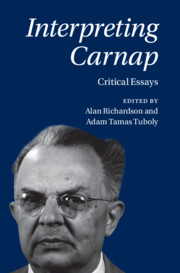Book contents
- Interpreting Carnap
- Interpreting Carnap
- Copyright page
- Contents
- Contributors
- Acknowledgments
- Abbreviations
- Introduction
- Part I Philosophy in New Dress
- Part II Naturalism and Method
- Part III The Logical and the Linguistic
- Part IV Science and Theories
- Chapter 12 Carnap on Theories and the Methods of Science
- Chapter 13 Carnap on Unity of Science
- Chapter 14 Carnap on Determinism and Free Will
- Bibliography
- Index
Chapter 13 - Carnap on Unity of Science
from Part IV - Science and Theories
Published online by Cambridge University Press: 01 February 2024
- Interpreting Carnap
- Interpreting Carnap
- Copyright page
- Contents
- Contributors
- Acknowledgments
- Abbreviations
- Introduction
- Part I Philosophy in New Dress
- Part II Naturalism and Method
- Part III The Logical and the Linguistic
- Part IV Science and Theories
- Chapter 12 Carnap on Theories and the Methods of Science
- Chapter 13 Carnap on Unity of Science
- Chapter 14 Carnap on Determinism and Free Will
- Bibliography
- Index
Summary
It is no secret that various versions of logical empiricism argued for the importance of unified science. Carnap was a proponent of unity of science views, although he expressed this in different idioms at different times. In the Aufbau (1928) he spoke of the unity of the object domain secured through definability in the constitutional system, in his physicalist period he argued that a physicalist language could serve as the universal language of science, and in his mature philosophical work he investigated a variety of meanings that might be attached to reductionist projects for unifying various scientific fields. Our essay focuses less on Carnap’s several proposals than on a prior interpretive question: what was philosophically at stake for Carnap in the question of the unity of science? We begin with some suggestions in Carnap’s 1963 Intellectual Autobiography, where he calls unity of science “one of the main tenets of our general philosophical conception” and one in which Neurath’s emphasis on the “interdependence of all decisions … made a strong impression” on him. We follow Carnap in the suggestion that an account of his approach to unity of science does not take us into questions of unity of nature but rather of the scientific attitude and the unity of reason.
- Type
- Chapter
- Information
- Interpreting CarnapCritical Essays, pp. 252 - 269Publisher: Cambridge University PressPrint publication year: 2024

